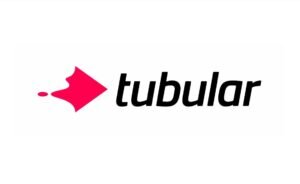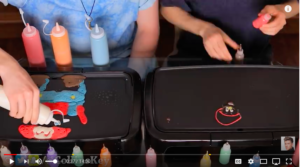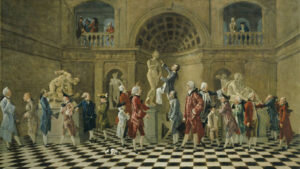The Revisionists: Allison Stern of Tubular Labs
Allison Stern is Chief Marketing Officer and co-founder of Tubular Labs, whose software now tracks more than 4 billion videos, 400 million video consumers, 10 million influencers, 90,000 brands, 40,000 media, and 48 billion sponsored video views. Tubular also issues a quarterly State of Online Video report and created the annual VideoAces Awards, honoring the sector's 52 best companies and creators, as well as the top brand partners on Facebook.
How’d you get your start?
My goal was actually always to be in the media industry. So my story is, I love stories, love storytelling. I was always kind of collecting funny stories for myself, and people on the playground, and I was filming video with my cousins. Our top movie was called "Rascal Student Driver," which was about our childhood dog. I wanted to be in the media industry, and when I was in college (at Yale), I ran the TV station, and I interned at NBC News and 20th Century Fox.  I was interning out in L.A., getting people their coffee, and there was a guy, Mark Pearson, who still works at Fox and who's awesome. He's on the business side and he gave me project. He said, "We are doing something where we put our episodes up on iTunes, and we need to track how well that's doing." So I logged in every day and wrote numbers down, because that was what digital video was in 2006.At the end of the summer, I went around and talked to everybody, and asked them, "Do you enjoy your job?" And Mark was like, "I work with the most amazing IP (intellectual property) at 20th Century Fox. I get to work on the inspiring Fox lot. And when I wake up in the morning I go surfing.." When you're applying to business school, they ask you, "What do you want to be when you grow up? What do you want to do? Where do you see yourself in 5, 10, 15 years?" I knew I wanted to find something that was at the intersection of all my passions. I wrote, "I want to go to the West Coast. I want to spend time re-immersing myself in the media industry. I want to come up with a business that merges media and technology, doing something interesting in the digital media space, that helps revolutionize what's happening in the media industry." That's what I did. I went out to business school at Stanford. I took the time while I was there to run the Future of Media Conference, and interned at YouTube.Ultimately, while I was working at YouTube, I realized there was going to be a need for a Nielsen for the online video world. Or somebody who's focused on video intelligence, for all the brand dollars that were rushing into online video. The platforms were there for the democratization of video, and the creative landscape, and there were all these interesting trends happening with video. But there was no one to measure it and provide insights. That was the key insight around Tubular.
I was interning out in L.A., getting people their coffee, and there was a guy, Mark Pearson, who still works at Fox and who's awesome. He's on the business side and he gave me project. He said, "We are doing something where we put our episodes up on iTunes, and we need to track how well that's doing." So I logged in every day and wrote numbers down, because that was what digital video was in 2006.At the end of the summer, I went around and talked to everybody, and asked them, "Do you enjoy your job?" And Mark was like, "I work with the most amazing IP (intellectual property) at 20th Century Fox. I get to work on the inspiring Fox lot. And when I wake up in the morning I go surfing.." When you're applying to business school, they ask you, "What do you want to be when you grow up? What do you want to do? Where do you see yourself in 5, 10, 15 years?" I knew I wanted to find something that was at the intersection of all my passions. I wrote, "I want to go to the West Coast. I want to spend time re-immersing myself in the media industry. I want to come up with a business that merges media and technology, doing something interesting in the digital media space, that helps revolutionize what's happening in the media industry." That's what I did. I went out to business school at Stanford. I took the time while I was there to run the Future of Media Conference, and interned at YouTube.Ultimately, while I was working at YouTube, I realized there was going to be a need for a Nielsen for the online video world. Or somebody who's focused on video intelligence, for all the brand dollars that were rushing into online video. The platforms were there for the democratization of video, and the creative landscape, and there were all these interesting trends happening with video. But there was no one to measure it and provide insights. That was the key insight around Tubular.
What inspires you?
I think throughout history, people have really connected to people's inner stories, and stories of their lives. That's what we see today. People feel much closer to (creators). This sort of authenticity is the buzzword of today with content. Today's generation doesn't like glitzy ads, and they don't like highly produced content. They like these authentic moments. They like it when athletes Snapchat something in the car, or from home, after the game, not the clip of the game. It's the way that people throughout history have connected with each other. People have always told stories, beginning first around the fire, all the way to YouTube, and Facebook, and Snapchat, and Instagram stories. Stories have always existed. It's just the distribution channel that's changed.
What are you doing now?
We're tracking every online video out there across YouTube, Facebook, Instagram, Twitter. That's over 4 billion videos, adding millions of new videos every day. It's billions of comments. It's 10 million influencers, and media companies, and brands that are publishing content. Every quarter, our trend analysts look through what's trending, what's popping, what's happening.We still keep track of the growth of the entire industry, but it just continues to point up and continue growing. What we did this quarter was really dig into those interesting trends, to say, "What's happening? What are we seeing?" There are some trends, like on unboxing (videos), that have been happening for years, where people will take out of the box electronics, and talk about them. That trend had about 500 million views in Q4. That's higher than it usually gets, but pretty consistent. Whereas, we had some trends that showed up out of the blue that had been at zero, had not been a trend at all. For example, fancy foods made easy. So, people giving lessons on how to make really fancy dishes, restaurant-quality, well-known dishes, but in an easy kind of way. That was something that grew about 400 percent. There were no videos about that previously, and then Q4 had about 450 million views out of nowhere. Those are the types of things we look at and analyze.
For example, fancy foods made easy. So, people giving lessons on how to make really fancy dishes, restaurant-quality, well-known dishes, but in an easy kind of way. That was something that grew about 400 percent. There were no videos about that previously, and then Q4 had about 450 million views out of nowhere. Those are the types of things we look at and analyze.
What’s the biggest change you’re focused on?
The thing that's most frightening, of course, is what is real and what is fake. When authenticity becomes the buzzword, and you start connecting with people for these authentic stories, what happens if those people start lying to you? It's hard to tell what's true and false. That's an interesting challenge of the age, too. Whether that's making sure they represent when they are sponsored by a brand, or whether it's fake-news problems, it's an interesting challenge to think about and solve. I think it's less about the platforms, and more about education in our nation. And making sure people are capable of critical thought.
What are you revising?
When I was in college, I made this documentary around historical memory in Rome. Like how do people live with ruins? What is it like to interact with history in your day-to-day life? So I went to Rome, and I made this documentary. I filmed 18 tapes worth of footage, and then I never edited it. Two months ago, I sent it away to be digitized. I might have someone put the documentary together.
What the $%&*?
I'm a big fan of studying liberal arts. I work in the technology industry. I do believe that studying computer science is really important for people in the US today, because there are so many jobs. We're trying to hire great engineers at Tubular, and we get tens of thousands of applications. We still can't always find the talent we need, so I think it's a good opportunity. That said, you have these opportunities to study liberal arts. I think it creates a way of critical thinking and analysis, and a certain way of looking at the world that I think is really valuable for not just being able to create technology, but understanding how that technology applies to the world, and what you can do with it. I feel like in the study of history, I learned a lot around looking at insights, looking at trends, piecing together a bigger story. I wrote my thesis on the 18th Century Grand Tour diaries. British travelers traveling to Rome, and their evolving perceptions of Rome across the 18th Century. I spent an entire year reading through 18th Century diaries. Yale has the largest collection of Grand Tour diaries, but they hadn't really been studied in this way. I went in with my little white gloves, and I read them all. It was about reading all of this and synthesizing it, and coming up with a thesis around what was in these diaries.When I look at all the video data, I mean, we're sitting on top of 4 billion videos, 10 billion comments, coming from 10 million video publishers. It's huge data, but no one cares about the huge data. They care about the insights that come out of it. So, I do feel like sitting on that goldmine of data is like sitting on 100 Grand Tour diaries. What are the insights you can pull from it that will help people in the media industry in their job? It's not just data for data's sake, but the golden insights that will help people drive their business forward. That's the lens I try to bring to whatever I do.
I feel like in the study of history, I learned a lot around looking at insights, looking at trends, piecing together a bigger story. I wrote my thesis on the 18th Century Grand Tour diaries. British travelers traveling to Rome, and their evolving perceptions of Rome across the 18th Century. I spent an entire year reading through 18th Century diaries. Yale has the largest collection of Grand Tour diaries, but they hadn't really been studied in this way. I went in with my little white gloves, and I read them all. It was about reading all of this and synthesizing it, and coming up with a thesis around what was in these diaries.When I look at all the video data, I mean, we're sitting on top of 4 billion videos, 10 billion comments, coming from 10 million video publishers. It's huge data, but no one cares about the huge data. They care about the insights that come out of it. So, I do feel like sitting on that goldmine of data is like sitting on 100 Grand Tour diaries. What are the insights you can pull from it that will help people in the media industry in their job? It's not just data for data's sake, but the golden insights that will help people drive their business forward. That's the lens I try to bring to whatever I do.
Funny Story…. At Yale, I majored in history. I actually thought I was going to be an archaeologist. I really wanted to be an archaeologist. I studied Latin, and it's a whole separate life that didn't come together over there. I ended up transferring into history, because you had to wake up too early in the morning to go on archaeological digs.

